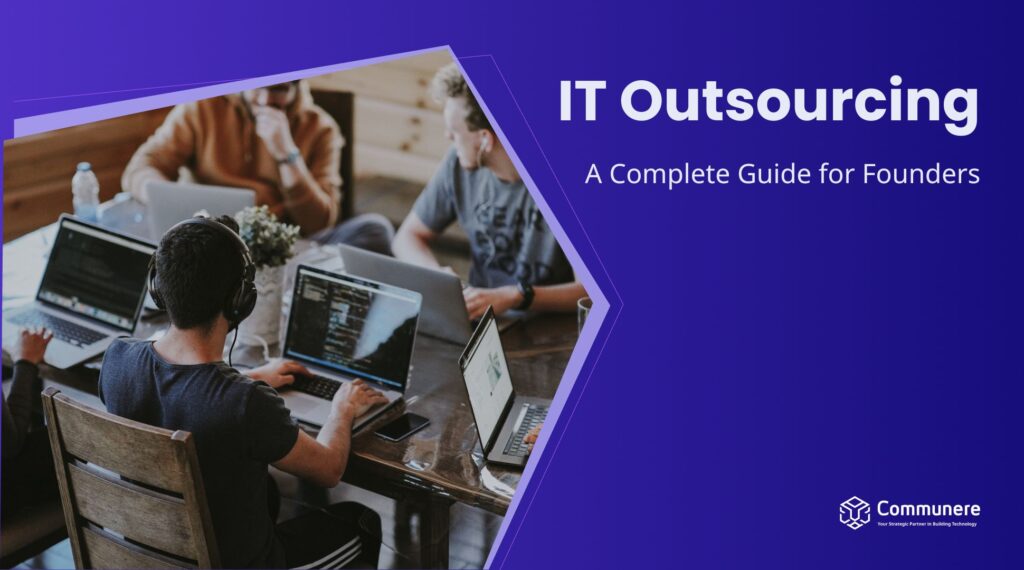To find and hire dedicated developers has become a pivotal task for startups, businesses, and entrepreneurs looking to bring innovative ideas to life. This quest is not just about filling a position but about finding a partner who can contribute to the vision and growth of your project. In this introduction, we’ll explore the importance of dedicated developers and set the stage for understanding how to find the right talent for your needs.
Table of Contents
The Vital Role of Dedicated Developers
Dedicated software developers are the backbone of any tech project. They bring your ideas to fruition, solve complex problems, and ensure your digital products meet the highest standards of quality and innovation. Unlike freelancers who might juggle multiple projects, dedicated developers focus solely on your project, ensuring consistency, dedication, and a deep understanding of your objectives.
Why Finding the Right Developers Matters
The right developer brings more than just technical skills to the table. They contribute to the strategic direction of your project, help navigate challenges, and bring innovative solutions to complex problems. Moreover, their commitment can significantly impact the pace and success of your project development. Finding developers who align with your project’s culture, values, and long-term goals is crucial for seamless collaboration and project success.
Determining Your Needs
Before diving into the vast sea of tech talent, it’s crucial to map out precisely what you’re fishing for. Think of your project as a puzzle; what pieces are you missing? Identifying these missing pieces will guide you in finding the perfect fit for your software development team. Here’s how to start:
- Understand Your Project Inside and Out
First and foremost, understand the scope of your project. What are you trying to build? Is it a mobile app to revolutionise food delivery or a web application to streamline online education? Knowing the end goal will help you pinpoint the skills necessary for the job.
- List the Skills and Technologies Required
Next, break down your project into smaller components and list the technologies and skills needed for each. For instance, if you’re building a mobile app, you might need developers proficient in Swift (iOS) or Kotlin (Android). A web development project might require skills in JavaScript frameworks like React or Vue.js. Don’t forget to consider backend technologies such as Node.js or Ruby on Rails, as well as database management systems like PostgreSQL or MongoDB.
- Consider Experience and Soft Skills
While technical skills are paramount, your dedicated developer’s experience and soft skills can greatly impact your project’s success. Are you looking for someone who has navigated the waters of startup culture and understands the pace and flexibility required? Or perhaps someone with experience in a more structured corporate environment?
Soft skills like communication, problem-solving, adaptability, and teamwork are just as crucial. These skills ensure your developer can integrate smoothly into your team, understand your vision, and contribute to a positive and productive work environment.
- Cultural Fit and Remote Work Considerations
In today’s global marketplace, your ideal developer might not be in the same city, country, or continent. This opens up a world of talent but also brings considerations such as time zone differences, language barriers, and cultural fit. Ensuring that your developer can communicate effectively in your preferred language and work within your time zone can alleviate many potential headaches down the road.
Find and Hire Dedicated Developers
Finding the right talent is pivotal in scaling your business or bringing your digital project to life. Dedicated developers can be the catalyst that transforms your vision into reality, offering their coding skills and commitment to your project’s success. Let’s explore effective strategies to find these indispensable resources.
- Partner with Communere
Communere emerges as a compelling option that merits consideration for businesses looking to harness the power of software development talent globally.
We might appear as yet another company in the crowded software development field. Yet, we distinguish ourselves through a unique value proposition that transcends traditional software development, venturing into the realm of matchmaking clients with premier software development talent.
- Utilise Online Platforms and Networks
Start by leveraging platforms known for connecting businesses with tech talent. Freelance websites, professional networks like LinkedIn, and specialised developer forums are excellent places to start. Platforms such as GitHub and Stack Overflow allow you to gauge a developer’s expertise through their contributions to projects and community interactions. B2B portals like Clutch provide detailed reviews and rankings of software development companies, offering insights into their past projects and client feedback.
- Tech Events and Meetups
Attending tech meetups, conferences, and hackathons can also connect you with dedicated developers. These events are not just networking opportunities; they’re also where you can witness firsthand the problem-solving skills and technical prowess of potential candidates in a collaborative environment.
- Referrals and Industry Contacts
Don’t underestimate the power of your network. Ask for referrals from business associates, colleagues, and friends within the tech industry. Personal recommendations can lead to trustworthy and proven talent, often vetted through firsthand experience.
- Dedicated Development Agencies
For those looking for a more comprehensive solution, dedicated development agencies offer teams that can be tailored to your project’s specific needs. These agencies handle the vetting process for you, providing skilled professionals who can work as an extension of your in-house team. They often offer flexibility in scaling your team size based on project demands, making them a valuable option for projects of all sizes.
- Social Media and Tech Forums
Engaging with the developer community on social media platforms and tech forums can also be fruitful. Participating in discussions and sharing your project vision can attract developers who are passionate about your domain and interested in contributing to innovative projects.
- Educational Institutions
Partnering with universities and coding boot camps is another avenue to explore. Many institutions are open to collaboration with businesses for internships, project work, or recruitment. This approach can give you access to fresh talent eager to prove itself in the real world.
Choosing the Right Partner
After pinpointing your needs, the next step is to find the right development partner. This phase is all about research, evaluation, and a bit of intuition. Let’s navigate through the crucial steps to ensure you team up with the perfect match for your project.
- Cast a Wide Net
Start by exploring various platforms and networks to compile a list of potential candidates or firms. Freelance platforms, B2B portals like Clutch, developer communities (GitHub, Stack Overflow), and specialised out-staffing services are fertile grounds for finding top-notch talent. Clutch, for instance, is particularly useful for its detailed profiles and client reviews of software development companies.
- Evaluate Track Records and Expertise
Once you have a list, delve into each candidate’s history and expertise. Look for those with a proven track record of handling projects similar to yours. Client testimonials, case studies, and portfolio pieces are invaluable here. This step not only assures their technical capability but also gives insight into their problem-solving skills and ability to innovate.
- Discuss Your Project Thoroughly
Initial conversations with potential partners should go beyond surface-level discussions. It’s crucial to discuss your project in detail, including your expectations, the technologies involved, and the desired outcomes. This dialogue helps assess whether they truly understand your vision and are enthusiastic about making it a reality.
- Compatibility Check
Compatibility extends beyond technical skills. It includes communication style, work ethic, and corporate culture. Ensuring a cultural and ethical alignment is key to a smooth collaboration. A partner who shares your values and vision can significantly contribute to the project’s success.
- Financials and Flexibility
Of course, budget is a significant consideration. Discuss their pricing model openly to ensure it aligns with your financial expectations. It’s also wise to discuss their flexibility in scaling the team up or down based on your evolving project needs.
- The Trial Project
If possible, start with a small trial project. This approach allows you to evaluate their work ethic, communication, and deliverable quality firsthand before committing to a larger engagement. It’s a practical step to ensure alignment on all fronts.
Onboarding and Collaboration
After selecting the right development partner, the next crucial steps are onboarding and setting the stage for effective collaboration. A smooth onboarding process and clear communication are the backbone of a successful project. Let’s delve into how to ensure both.
Onboarding Process
- Setting Up the Environment: Start by providing all the necessary tools, access, and documentation your development team needs to hit the ground running. This includes access to version control systems, project management tools, and any other software critical to the development process.
- Comprehensive Orientation: An initial meeting to discuss the project’s goals, timelines, and expectations can set a positive tone. Introduce them to key team members they will be working with directly. This helps build rapport and align everyone toward a common goal.
- Documentation is Key: Ensure there is detailed documentation on the project requirements, coding standards, and best practices. This documentation serves as a reference point throughout the project lifecycle and ensures consistency in the work delivered.
- Regular Check-ins: Establish a routine for regular updates and check-ins. Depending on your project management methodology, this can be through daily stand-ups, weekly meetings, or bi-weekly sprint reviews. These check-ins provide a platform for updates and feedback and address any early roadblocks.
Fostering Effective Collaboration
- Communication Tools and Protocols: Implementing the right tools (e.g., Slack, Microsoft Teams, Jira) is essential for seamless communication. Equally important is establishing communication protocols. Decide how often updates are required, which medium to use for different types of communication, and how to handle urgent issues.
- Building a Relationship: Invest time building a relationship with your dedicated developers. Understanding their work style, motivating factors, and expectations can enhance collaboration. A relationship built on trust and respect is fundamental to overcoming challenges and achieving project success.
- Feedback Loop: Create an environment where feedback is freely exchanged. This includes constructive criticism and recognition of good work. Feedback helps in continuous improvement and aligning the project closer to its objectives.
- Adaptability and Flexibility: Be prepared to adapt plans based on project evolution. Flexibility in handling changes, whether it’s adjusting features, timelines, or priorities, ensures that the project remains on track even when unforeseen challenges arise.
- Cultural Sensitivity: If you’re working with a globally distributed team, being mindful of cultural differences and time zones is crucial. Celebrate diversity and strive for inclusivity in all team interactions. This understanding can significantly enhance collaboration across borders.
Overcoming Challenges
Collaborating with dedicated developers, especially when they are remote or part of a different organisation, can present several challenges. These hurdles can range from communication barriers to differences in work culture. However, with the right strategies, these challenges can be navigated successfully. Let’s explore how to overcome some common issues.
Cultural and Linguistic Differences
One of the primary challenges is bridging cultural and linguistic gaps. Misunderstandings can arise from differences in communication styles or work ethics. To mitigate this, consider the following:
- Cultural Sensitivity Training: Encourage or provide access to cultural sensitivity training for both your in-house team and the dedicated developers. This fosters a deeper understanding and respect for each other’s cultures.
- Clear Communication: Use simple, clear language in all communications and avoid jargon or colloquialisms that might not be well-understood. Establishing a common language for communication, typically English, ensures everyone is on the same page.
Time Zone Differences
Working across different time zones can affect the synchronicity of teamwork and deadlines. Here’s how to handle it:
- Overlap Hours: Find a window of time when working hours overlap and schedule daily or weekly meetings during these times. This ensures real-time communication at least once every working day.
- Flexible Deadlines: Where possible, set flexible deadlines that account for the time difference, ensuring that all team members can contribute effectively without the pressure of odd working hours.
Data Security
With cyber threats on the rise, ensuring your project’s and data’s security is paramount. Here’s how to enhance security:
- Non-Disclosure Agreements (NDAs): Have all involved parties sign NDAs to protect your intellectual property and project confidentiality.
- Security Protocols: Implement strict security measures, such as encryption, secure access protocols, and regular security audits. Educate your team on best practices for data security.
Managing Expectations
Aligning expectations regarding project outcomes, timelines, and quality standards can be challenging, especially when working with new partners. To address this:
- Detailed Project Documentation: Create comprehensive project briefs, including scope, timelines, deliverables, and quality benchmarks. This ensures everyone understands the project goals and standards.
- Regular Check-Ins: Conduct regular status meetings to review progress, address any discrepancies in expectations, and make adjustments as needed.
Ensuring Productivity
Maintaining productivity across distributed teams requires strategic management. Here are some tactics:
- Project Management Tools: Utilise tools like Jira, Trello, or Asana to keep track of tasks, deadlines, and progress. These tools provide visibility and accountability for all team members.
- Performance Metrics: Establish clear metrics for measuring productivity and quality. Regularly review these metrics with your team to identify areas for improvement.
The Conclusion
The journey from conceptualising your project to bringing it to life with the help of dedicated developers requires diligence, strategic thinking, and a partnership approach. Remember, the developers you choose to work with are not just contractors; they are partners in your project’s journey. The emphasis on cultural fit, clear communication, and mutual respect cannot be overstated. These elements are just as critical as technical expertise in determining the outcome of your collaboration.
The strategies discussed here provide a roadmap for smooth navigation in the face of challenges such as cultural and linguistic differences, time zone disparities, data security concerns, and aligning expectations. Implementing these strategies will help overcome these hurdles and build a foundation for a strong, productive, and mutually beneficial relationship with your dedicated developers.
The decision to hire dedicated developers is significant and could catalyse your project’s success. By carefully considering your needs, choosing the right partners, fostering effective collaboration, and strategically overcoming challenges, you’re setting the stage for a project that meets its goals with flying colours.
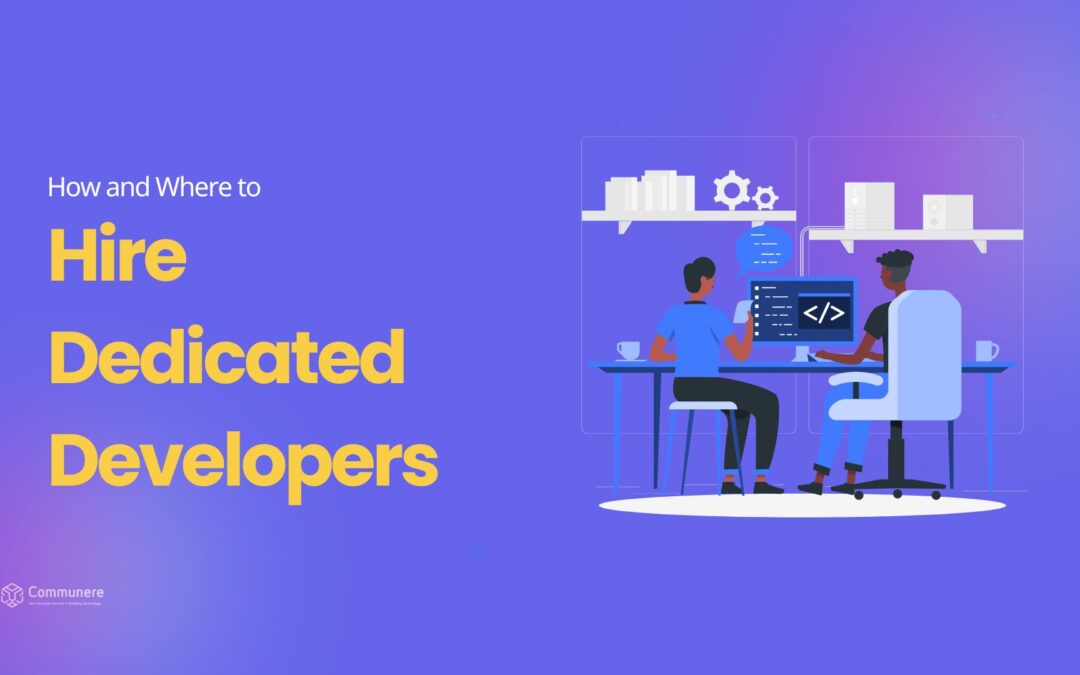
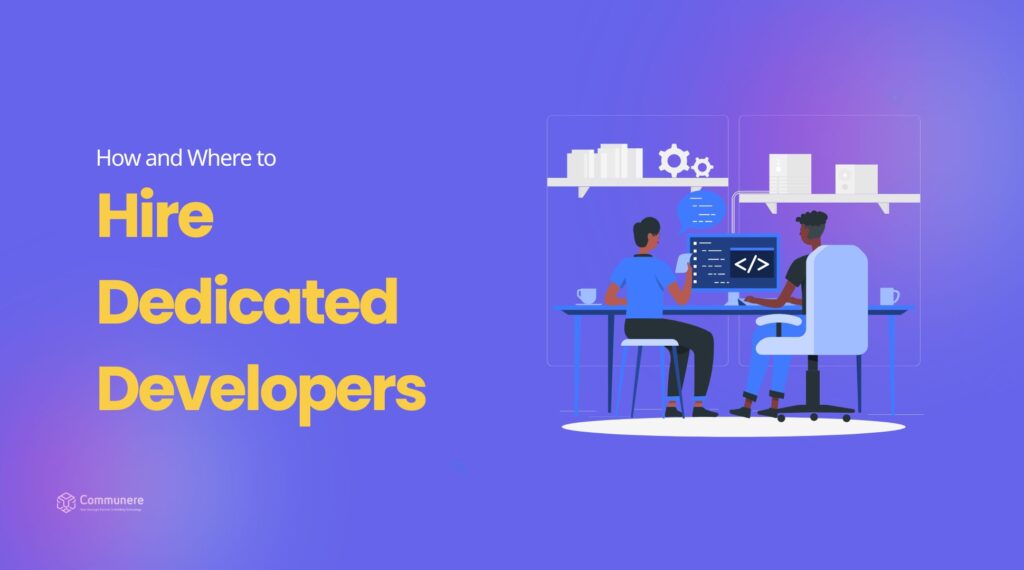
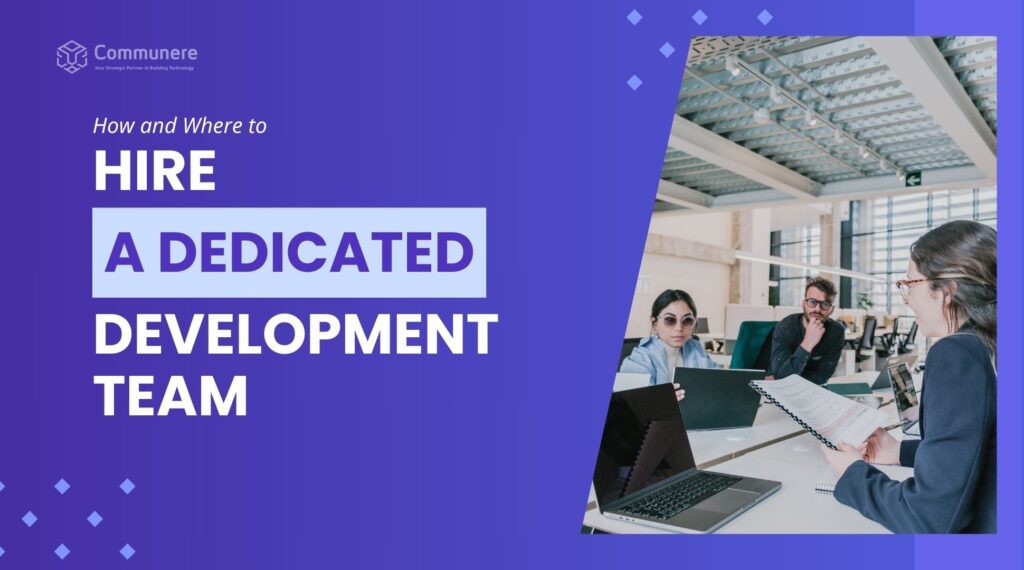
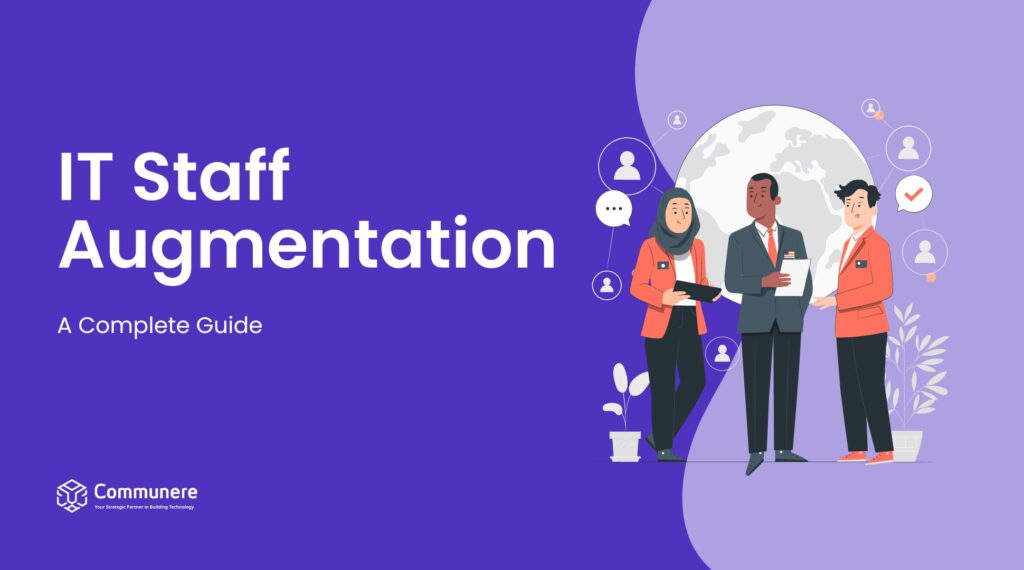
![Why Custom Web Development is the Best Approach [2024]](https://resources.communere.com/wp-content/uploads/2024/02/Why-Custom-Web-Development-is-the-Best-Approach-1024x570.jpg)

